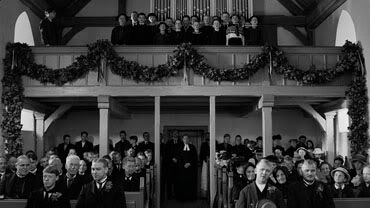The White Ribbon (2009)


Michael Haneke's "The White Ribbon," is shot in gorgeous and classic-looking black and white by cinematographer Christian Berger (whose work received a nomination in this year's Academy Awards), and it is a film that could not be seen in any other way. For this film to be viewed in color would strip it of its deepest themes about purity and innocence against pure evil and insecurity. Haneke also directed "Caché," a film that closely resembles "The White Ribbon" not only in terms of its extended long takes but also in creating a sense of impending dread, a sense that nothing is safe and no clue ever provides a path to a clear-cut resolution. Except in his latest film, nominated for Best Foreign Language Film in this year's Academy Awards and projected winner, this is pre-Nazi Germany on the eve of World War I. The doom and gloom here has much greater implications beyond the small German village in which the film takes place, which gives the unraveling events a heavy weight that drapes over you gradually as you watch.
Strange accidents begin occurring throughout the village. First the doctor (Rainer Bock) gets tripped by a wire while riding his horse sending him to the hospital. That wire was not placed there by accident. And the term "accident" relating to this occurrence and the ones following begins to fade away. A barn is set on fire, crops are ruined, animals are harmed and several children are abused. Who is committing all of these acts of wrongness and strange cruelty? Perhaps the same person? Or a group of people? Is it someone different each time? And most of all, why are these incidents taking place? And why now? This film is full of questions and few answers. It is meant to unsettle, to challenge and to provoke. Something is either happening or about to happen throughout the village, and the narratives of a dozen characters are juggled expertly. There are loose ties between them, but for the most part they work as separate vignettes interweaving together as parts to the whole. We are set to watch a culture, a small society, a way of life and nothing more. It just so happens that right now something terrible is on the horizon.
The film is slow and laborious as it moves through the numerous lives of its characters. It is narrated by a schoolteacher (Ernst Jacobi) who is younger (Christian Friedel) when the story takes place. At its beginning, the old, wise voice of the schoolteacher says that he felt this story needed to be told. Simple as that. No conclusions drawn and no bias. As for the schoolteacher's role in the events, he courts a young girl named Eva (Leonie Benesch) and observes all else. He makes some inquiries and remarks, gets criticized and stays silent. The film is subtle about its acts of malevolence put on display. The doctor verbally assaults his midwife (Susanne Lothar), the Baroness (Ursina Larni) tells the Baron (Ulrich Tukur) that she is in love with another man and children are scolded. The pastor (Burghart Klaussner) ties a white ribbon to his children's arms to represent purity and innocence. This, however, works as an act of hypocrisy on the pastor's part. This is a village full of inhabitants who, for the most part, have gone morally astray.
"The White Ribbon" works in nuances in showing how seemingly small and insignificant acts can have grander meanings, and through such, Haneke becomes obvious in his ultimate intent. The announcement of Franz Ferdinand's assassination arrives bluntly and reveals a wider scope. One violent act can spark something huge. This film is not just a meditation on this specific time but all times about how any growing negative sentiment, no matter what scale, can permeate through a society like an infectious disease. The small German village is a microcosm of an example. Was it their nature that created the future of Nazism? Were these children brought up in a culture that promoted and tailored to such thinking? Haneke seems to think so, and he lets viewers decide on their own with a disturbingly open-ended final scene. And as a final note, any film by Michael Haneke is the furthest thing from the film equivalent of comfort food, so brace yourself. And this one in particular is one where the more I pondered over it afterward, the more I admired it.





No comments:
Post a Comment